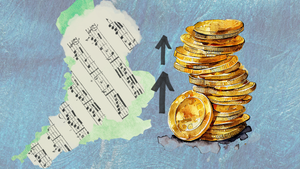The economic impact of the music industry in the UK increased again last year, so that the sector’s ‘gross value added’ sum topped £8 billion in 2024, up 5% year-on-year. Music exports also reached a new high, rising 5% to £4.8 billion.
That’s according to the latest ‘This Is Music’ report from UK Music, which seeks to quantify the economic impact of the wider music business, including recordings, compositions, live music, and artist brands and merchandise. According to UK Music’s figures, the music industry workforce also grew last year, to the equivalent of 220,000 full-time jobs.
A key aim of ‘This Is Music’ is to demonstrate the value of music to - and therefore influence - ministers and officials in government, and the political community more generally.
Which means it’s one of those reports that has to deal with the tricky balancing act of simultaneously saying “everything’s brilliant”, but also - if ministers don’t urgently deal with the music industry’s current list of gripes - it’ll all be fucked very soon.
UK Music CEO Tom Kiehl deftly moves from “everything's brilliant” to “it’ll all be fucked very soon” by pointing out that - while the economic impact of the music industry is still growing - that growth has slowed and is by no means guaranteed long-term.
“In recent years UK Music has reported that the music industry has enjoyed double-digit annual growth”, he says on launching the new edition of ‘This Is Music’. But the rate of growth has halved, and that “indicates a levelling off of the immediate post-pandemic boost that we experienced, as well as other underlying issues set out in this report”.
“This points to the need for urgent action”, he adds, by which he mainly means urgent action from the government. Because, “if problems are not addressed then future growth cannot be guaranteed”.
The report then identifies four key issues. First, the lengthening artist development cycle, meaning artists have to work harder and for longer before reaching the “breakthrough moment”. Second, the ongoing threat to the grassroots music ecosystem, as recording studios and grassroots venues continue to struggle, and “the cost of recording and touring for grassroots music creators is especially tough”.
Third, the widely discussed impact of AI. And fourth, international touring, with new stats on the impact of Brexit on artists, revealing that 32% of music creators who were surveyed say that the bureaucratic implications of Brexit on touring and other Europe-wide activities are negatively impacting their businesses.
UK Music then sets out some specific calls for action from the government on AI and touring. We already know what the AI demands are - ministers should tell AI companies they must get permission before making any use of existing music and new laws should force AI companies to declare what music they have already used when training their generative AI models.
As for action on touring, the government should work to “secure an agreement with the EU to remove barriers to cultural exchange such as visa and work permit requirements” and “negotiate a reciprocal agreement with the USA on visa fees for performing artists and crews”.

